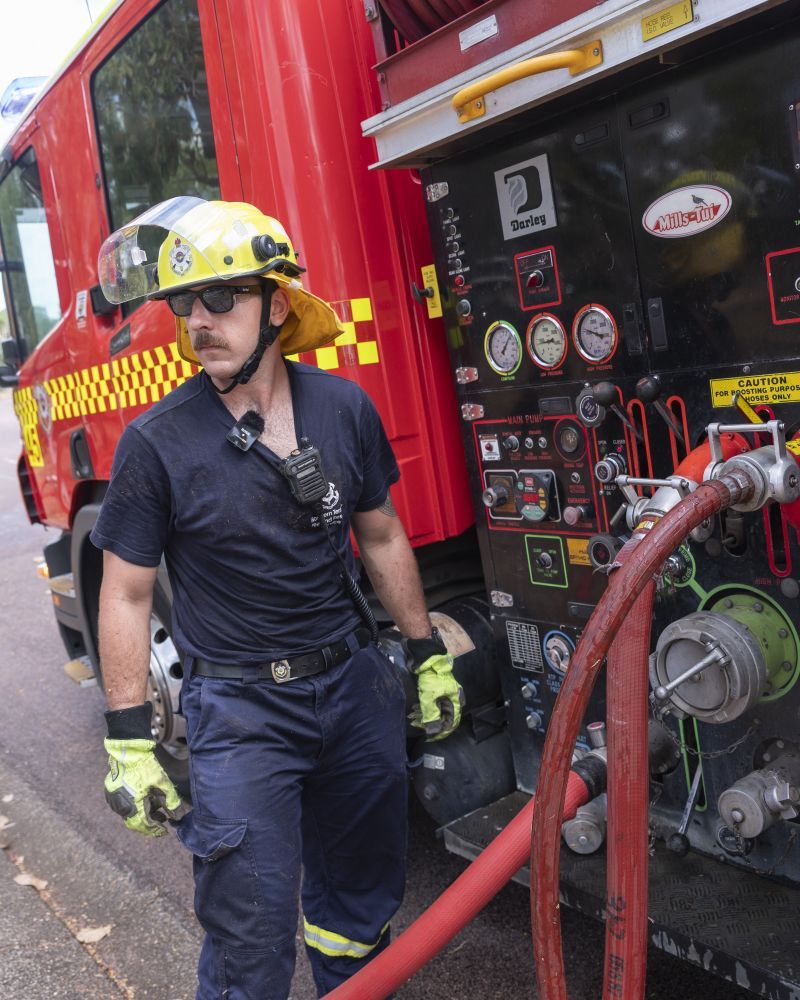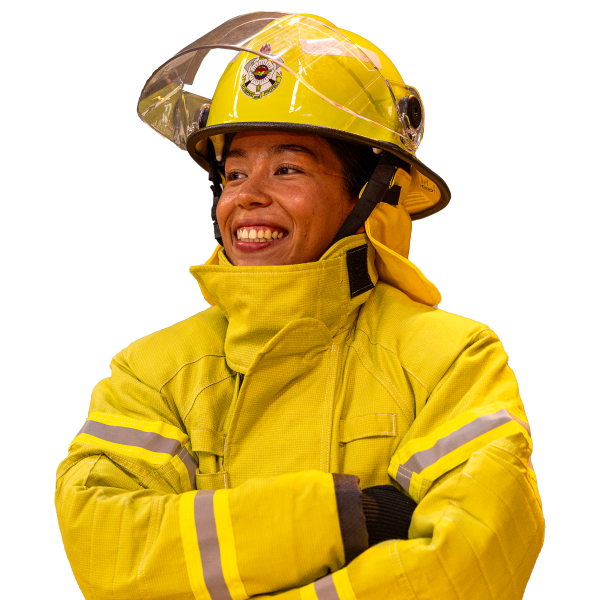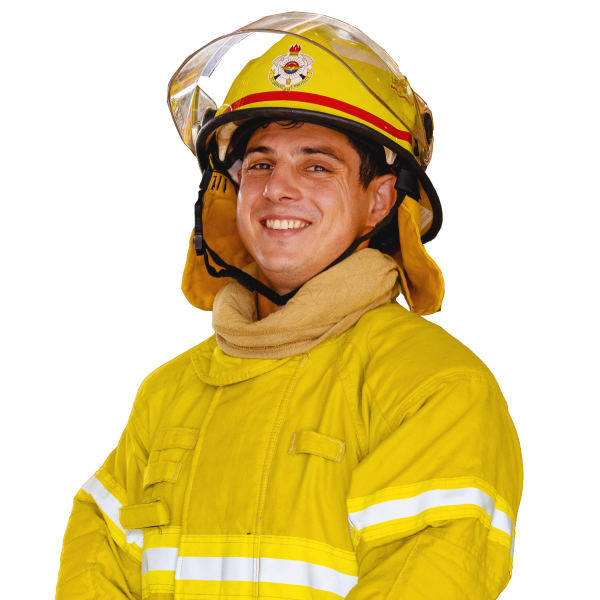There are great opportunities and exciting challenges, not to mention the great lifestyle that the Northern Territory offers.
Tips for your best application
Thorough preparation will enable you to perform to the best of your abilities at interview, giving you the best possible chance in securing a permanent firefighter role.
Preparing for the beep test
The Beep Test is a multi-stage fitness test (MSFT) which is widely used to measure aerobic fitness by predicting maximum oxygen uptake (VO2max) and performance. The test requires individuals to perform 20m shuttle runs (back and forth), whereby they must reach the end of the 20m grid before the next beep. The time recorded beep.
decreases each minute (stages reduce from 2 min to 1 min), forcing individuals to increase running speeds (initial running velocity is 8.5km/hr and increases 0.5km/hr each minute). The cumulative distance and time of the full test.
(Level 21.16) is 4.94km and 22min 51sec respectively. Northern Territory Fire and Rescue Service (NTFRS) requires candidates to successfully complete Level 9.6 which is 1.56km in distance and 9min 3sec in total time.
For a full training schedule visit Preparing for the Beep test.
Understand the role
Being as prepared as you can be for what lies ahead is part and parcel of being a firefighter. Research everything you can about the role to help you to build an in-depth understanding of what being a firefighter entails. Information is provided below on the role and what NTFRS look for, but consider other ways to collect information including:
- Visit a fire station and talk to a firefighter
- Read the information available on the NTFRS website – think about the organisation, specialist areas, community safety campaigns and major incidents Firefighting in the Northern Territory There is much more to being a Firefighter in the Northern Territory than just putting out fires and performing rescues.
As a firefighter the work is varied, challenging and rewarding. In addition to fighting fires a firefighter role entails the following:
- Fire prevention and investigation
- Community education and activities related to safety and prevention, including fire education for children.
- Recovery and management of hazardous, toxic and flammable materials
- Recovery after storm and flood.
- Responding to rescue calls throughout the Territory, assisting people involved in domestic, industrial and transport incidents, including road accidents.
- Providing basic first aid until an accredited provider arrives, such as the St Johns Ambulance.
- Carrying out building inspections to prepare risk assessments and pre-incident plans.
- Maintaining good health and physical fitness.
- Undertaking ongoing development and maintenance of skills and knowledge through regular training and study.
- Cleaning/maintenance of equipment and the fire station. This includes core housekeeping duties such as cleaning the kitchen, vacuuming etc.

The skills, knowledge and abilities we are looking for
- Personal resilience and an ability to tolerate stressful situations
- Appreciation of the need to remain aware of risks and maintain a focus on safe work practices in situations that at times can be inherently dangerous
- Effective written and verbal communication skills, a commitment to service and helping others, and an interest and ability to engage with the public
- Demonstrated understanding of, and willingness to undertake, the full range of firefighter duties including a capacity to follow directions, ability to work shift work including weekends, flexibility in work locations and an interest in ongoing development
- Capacity to consistently demonstrate respect toward colleagues, the community and all others regardless of background, gender, age or differences
- Well-developed interpersonal skills and the capacity to work within, and contribute effectively to, a small team working in close proximity
- Ability to exercise self-discipline and use sound judgement in ensuring assigned tasks are completed to required standard and within tight timeframes
- Capacity to acquire new skills and demonstrated problem solving ability. Our values guide what we do Every aspect of the work we do at
NTFRS is guided by our shared values
Trust - we are committed, loyal and trustworthy to each other, the organisation and our community.
Respect - we will show respect for each other and recognise the value and significance of all those we interact with, especially victims.
Responsibility - we consistently work to a high standard and show strong leadership Integrity We act ethically, professionally and honestly in all of our interactions.
Courage - we uphold and act consistently with our values at all times.
Community - we are invested in ensuring consultation and collaboration with our people, our community and our stakeholders which drives our actions and decisions
Accountability - we are transparent, open and accountable for our actions and disciplined in our responses.
Understand the process
Applicants will be required to demonstrate through a structured behavioural interview that they have the skills, knowledge, values and experience to succeed and join our permanent firefighter ranks. The interview questions seek to obtain information on transferable skills, experience and attributes relevant to the role of a firefighter.
The interview process involves candidates facing a panel of three or four members and answering behavioural based questions.
Applicants undertake a structured interview to assess:
- Read more!
- personal suitability for a fire career
- general attitudes, beliefs and values
- thought processes and problem solving skills
- communication and interpersonal skills
- knowledge of the NTFRS.
This interview will take approximately 1 hour and all panel members will ask questions at some stage throughout the interview. The panel will not expect you to have an in-depth knowledge of NTFRS training, policy and procedures or be trained in firefighting; however, questions will refer to knowledge of the Northern Territory and NTFRS to enable an assessment of your thoughts and reasoning processes.
Interviewees should carefully consider their presentation before the selection panel.
The NTFRS will contact your referees during this stage. Due care is taken to establish the credibility of your nominated referees and to ensure confidentiality of information provided.
Applicants work performance is assessed by contacting a current supervisor who can comment on the applicant’s work ethic and relationships with fellow employees.

Understand you
This is an area where candidates often under prepare. You need to think about you, ask yourself:
- Why do you really want the job?
- What can you bring to NTFRS that makes you the best candidate?
- What makes you stand out from the crowd?
- What skills and experience do you bring?
- How will this make you the best firefighter?
- What other qualities and personality traits do you possess?
- What things are you passionate about at work and outside of work?
Interview tips
Before the interview consider the following:
- First Impressions
• Dress professionally, it will help you get in the right zone
• Check your hair/grooming, go easy on accessories, jewellery and perfume/cologne
• Have access to water/breath mints – lose the chewing gum
- Logistics
• Have your clothes, resume, pens, papers, watch and directions to the interview location ready ahead of time – the last thing you need is extra stress
• Arrive early - punctuality is a subtle clue about attitude and behaviour. Tardiness, no matter the excuse, does not reflect well
• Know yourself – your strengths, weaknesses and accomplishments
• Know your resume - your work history and experiences need to blended into your response to the interview questions so refresh on the detail
• Know your soundbites and story
• Leave your phone outside or at home. Even on silent the phone vibrating in your pocket will distract you
During the interview consider the following:
- Timing
• Be aware of the time you have for each question and fill it well, don’t waste it
• If you have time free ask the panel to repeat the question to make sure you are happy that you’ve answered it
- Greetings
• First impressions count so be enthusiastic and greet the panel positively
• Try to remember the panel member names. If you miss one, ask again
• A positive close to the interview is just as important
• Make eye contact – direct your contact between the panel members, be sure to focus on the person asking you the question
• Walk confidently, sit upright, don’t fidget or fiddle with your hands
• Try to convey positive body language where possible Be yourself
• The panel wants to see who you really are
• Be Confident but don’t be arrogant or too familiar
• Use professional language at all times
• Sell yourself but never be anything other than honest
Join Us!


